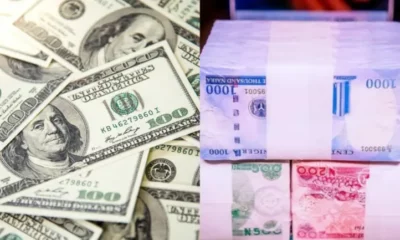Top Stories
External Reserves Fall By $1.46bn In Two Months- CBN
The country’s external reserves fell by $1.46bn between January and March, figures obtained from the Central Bank of Nigeria have revealed.
The reserves ended February 27, 2023 at $36.67bn.
Figures obtained from the CBN’s data on movement of external reserves on Sunday showed that the reserves, which stood at $36.99bn as of the end of January, 1, 2023, fell to $35.53bn as of the end of March, 30, 2023.
At the last Monetary Policy Committee in Abuja in March, the Governor, CBN, attributed the decline in the external reserves to the fall in crude oil price.
“The committee, however, noted the marginal decline in the level of gross external reserves to $36.13bn in February 2023, from $36.4bn in January 2023, a decrease of 0.7 per cent, reflecting the downtrend in crude oil prices, as global uncertainties persist,” he said.
According to the CBN data, Nigeria’s external reserves fell by $3.43bn in 2022, from $40.52bn as of the end of December 31, 2021, to $37.09bn as of the end of December 29, 2022.
Earlier in 2022, the CBN launched a programme tagged ‘RT200 FX Programme’ to boost forex supply in the country through the non-oil sector in the next three to five years.
Emefiele, while unveiling the programme, said, the RT200 FX Programme was a set of policies, plans and programmes for non-oil exports that would enable Nigeria to attain $200bn in FX repatriation, exclusively from non-oil exports, over the next three to five years.
He said the programme’s five key anchors were value-adding exports facility; non-oil commodities expansion facility; non-oil FX rebate scheme; dedicated non-oil export terminal; and biannual non-oil export summit.


 Politics12 hours ago
Politics12 hours agoBreaking: Prominent Nigerian Politician Is Dead(Photo)

 News15 hours ago
News15 hours agoFormer ECOWAS Court VP berates EFCC chairman over press briefing on Yahaya Bello

 Politics19 hours ago
Politics19 hours agoSanwo-Olu Launches Eko Cares Intervention For 500,000 Lagosians

 Top Stories15 hours ago
Top Stories15 hours agoBreaking: Parents ‘suspect foul play’ as boy, 4, dies in BrickHall School Abuja

 News19 hours ago
News19 hours agoTop Nigerian Newspaper Headlines For Today, Thursday, 25th April, 2024

 Politics15 hours ago
Politics15 hours agoBreaking: 118 Inmates Escape As Rainstorm Wreaks Havoc At Suleja Prison

 Top Stories9 hours ago
Top Stories9 hours agoRunway Mishap: ART Kicks Against Dana Suspension, Cautions Festus Keyamo

 News19 hours ago
News19 hours agoBlack Market Dollar (USD) To Naira (NGN) Exchange Rate Today 25th April 2024






